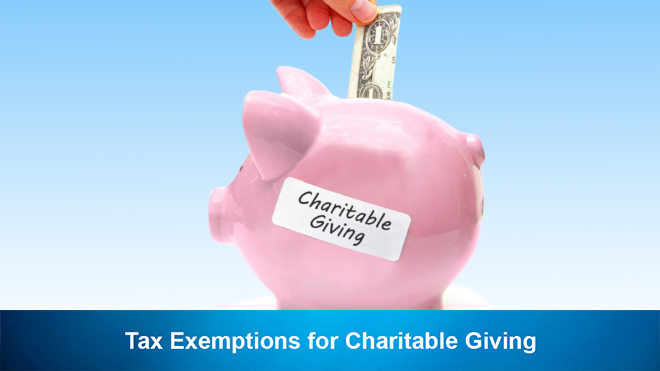With the holidays nearing – as well as the end of the fiscal year – now is a great time to consider charitable giving. Not only can you directly impact your community or charity of choice, but you can reap the tax deduction benefits too.
A frustration many feel when it comes to taxes is that we often don’t have a direct say where that money goes. While we enjoy the benefits of schools, roads and hospitals, there can be a lack of connection in feeling that your money had any direct impact on those things.
By giving gifts or donations of cash, you can de facto have a say in where your “tax money” is applied. These donations can then be deducted, lowering your taxes for the year.
How does this process work? What mistakes are there to avoid? Read on to learn how to apply charitable giving while reaping the benefits of the tax exemptions that go along with it.

The IRS states that “you may deduct up to 50% of your adjusted gross income…”. This is your total gross income minus specific deductions. There can be nuance to this, but we’ll keep it simple for now.
For example, If you’re filing as Head of Household, the 2022 tax year standard deduction is $19,400. If that number is higher than your itemized deductions, you need to weigh the costs of taking the time to itemize and lean on your standard deduction. If you do this, be aware you’re losing out on the deduction for your donations. If the amount you’re donating surpasses the standard deduction, then it’s more than worth your time to itemize and reap the benefits.
With that awareness, also ensure that you’re donating to organizations that qualify for deductions. These organizations should be a 501(c)(3) tax-exempt organization. The group you’re donating to should state this clearly in their literature or on their website. Do not assume; always verify.
Once you’ve determined your organization to donate to, ask questions and document the interaction. An organization should be able to let you know what percentage or amount of your donation will be tax-deductible. Document the process to ensure that you’re accurate during tax time.
It’s also important to note that if you choose to offer your time instead of your wallet, expenses related to volunteering can be considered tax deductible. Much like a standard donation, be sure to document the expenses for tax time.


When choosing to donate, there are a couple of documentation specifics to consider. First and foremost, ensure that you receive a receipt from the charity. The receipt should have three basic pieces of information – the charities name, donation amount and the date.
If you donate with cash, show this through a bank statement and if using a credit card, reflect this with a credit card statement for your records.
Some employers will offer the ability to donate a certain amount to a charity of your choice directly from your paycheck. If this relates to you, the W-2 for that year (along with pay stubs) will be your documentation.
Other considerations are cash/property donations with value over $250. If giving more than this amount, the IRS is going to ask for a “letter of acknowledgment” from the charity. This document should state if there was an exchange of goods or services for your donation, the amount of the donation and if you did receive something, its value.
If you plan to donate clothes, cars, or other items you should be aware of the following: If the value exceeds $500, you’ll be asked to fill out form 8283. If the value goes beyond $5,000, an appraisal of the items should be included with this form.

Be sure to deal with recognized charities and be wary of charities with similar-sounding names. It is common for scam artists to impersonate charities using bogus websites, email, phone calls, social media, and in-person solicitations. Check out the charity on the IRS website, irs.gov, using the Tax Exempt Organization Search tool. And don’t send cash; contribute by check or credit card.

As long as your charity qualifies, you’ve documented the process and the proper forms are filled out, you’ll be able to reap the benefits of charitable giving tax deductions.
While this process can be straightforward, if it’s your first time donating, we recommend that you speak to a trusted financial professional.
At CKS Summit Group, we understand the massive benefit of proper tax planning and preparation.
Ready to develop and refine your tax strategy with charitable giving? Reach out today, and let our team create a tax plan that works for you.



